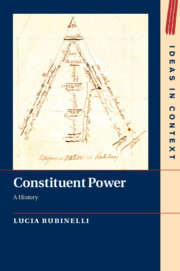Book contents
- Constituent Power
- Ideas in Context
- Constituent Power
- Copyright page
- Dedication
- Contents
- Acknowledgements
- Introduction
- Chapter 1 Sieyès and the French Revolution
- Chapter 2 Constitutional Politics in Nineteenth-Century France
- Chapter 3 The Weimar Republic
- Chapter 4 Constitutional Politics in Post–World War II Europe
- Chapter 5 Arendt and the French Revolution
- Conclusion
- Bibliography
- Index
- Ideas In Context
Introduction
Published online by Cambridge University Press: 28 April 2020
- Constituent Power
- Ideas in Context
- Constituent Power
- Copyright page
- Dedication
- Contents
- Acknowledgements
- Introduction
- Chapter 1 Sieyès and the French Revolution
- Chapter 2 Constitutional Politics in Nineteenth-Century France
- Chapter 3 The Weimar Republic
- Chapter 4 Constitutional Politics in Post–World War II Europe
- Chapter 5 Arendt and the French Revolution
- Conclusion
- Bibliography
- Index
- Ideas In Context
Summary
The modern state is built upon the principle that political power belongs to the people. Yet this principle has no uniform meaning. The very institutional structure of the modern state testifies to the plurality of understandings about the meaning, extent and implications of popular power. A quick look at modern European states reveals how each of their institutions is based upon a specific way of understanding and framing the power of the people. More strikingly, even within a single institution different conceptions of the people’s power play out simultaneously. As an example, it may suffice to think about how different the principle of popular power looks when invoked to justify the role of legislative assemblies and that of constitutional courts. The first institution is considered the forum where popular concerns and interests are elaborated, compromised upon and transformed into law by representatives.
Information
- Type
- Chapter
- Information
- Constituent PowerA History, pp. 1 - 32Publisher: Cambridge University PressPrint publication year: 2020
